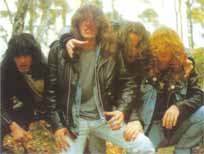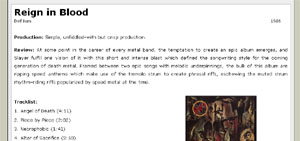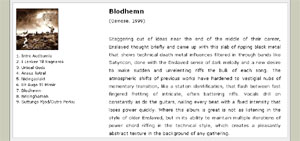Black Metal, Death Metal, Grindcore, Thrash and Heavy Metal Reviews from the net's original Heavy Metal site
Metal Genres
Death Metal Black Metal Grindcore Thrash Speed Metal Heavy MetalMetal Music
Heavy Metal F.A.Q. Interviews Philosophy Metal Concerts Heavy Metal CDs Heavy Metal MP3sMetal Media
Articles Heavy Metal Zines Heavy Metal Video Heavy Metal Books Metal LinksMetal Community
About Contact Metal Forum Letters Mailing ListAbout the Dark Legions Archive
The net's oldest and longest-running metal siteThe Dark Legions Archive appeared on the web in 1993, but existed in other forms online for five years before that. Our mission: to describe underground heavy metal music as a form of art, with cultural values and a philosophy behind it, so that this creative and insightful genre can be understood for the values that motivate its creators and fans to devote themselves to it.
About this site
This site began as a metal etext newsletter from 1987 to 1992. These were first broadcast onto the nascent internet through a dial-up bulletin board system distributed through FIDOnet, with several articles published in Houston-based metal magazine Rivethead. After this, the content moved to an FTP server, migrating to the WWW in 1993 -- where, on a series of hosts, and finally the anus.com domain, it has been ever since.
From 1991 to 2001, our primary writer was Spinoza Ray Prozak. He created formative underground radio show The Oration of Disorder from 1992-1998, and later became an internet radio pioneer with KCUF underground radio. A lifelong metalhead, he has been writing about metal since 1987, he began distributing articles, lyrics and information through the Apocalyptic Funhouse BBS and The Metal AE.
 As young metalheads, we recognized the total lack of critical information about the genre. People either dismissed it, or used it as a product for morons, and no one listened to what the bands and fans were saying. Those who hated it were only too happy to perpetuate stereotypes of its stupidity and encourage ignorance of the better material.
As young metalheads, we recognized the total lack of critical information about the genre. People either dismissed it, or used it as a product for morons, and no one listened to what the bands and fans were saying. Those who hated it were only too happy to perpetuate stereotypes of its stupidity and encourage ignorance of the better material.
Our goal is to describe this art reverently, with attention to detail and meaning, but never to forget that metal is there to be heavy and to bring pleasure to the listeners. It is an assertive, realistic, and passionate form of art in a world that is mostly concerned with spacing out and ignoring its moribund civilization. We want to uphold every aspect of that intent.
About the Reviews
We write reviews to sound like the music they describe: structuralist, occult, logical and passionate all at once. Like Romantic poetry, metal loves to merge scientific phenomena with the mystical in metaphor. As a result, you will find more freely experimental text here. We use every tool at our disposal to convey the spirit of the music.
The average person has been told that he or she is stupid. This is not so; however, the average person is ignorant and undisciplined. We know that our readers can take advantage of dictionaries and encourage them to do so. They are smart enough to know these words and use them well, and we encourage that, as less-common words allow us to use more specific meanings and have fun with language, so we write in a style common 200 years ago that is the intersection of science, philosophy and literature.
While most review sites try to communicate a liking of the music, we only review music we find important. Our goal is to describe how it sounds, how it fits into the historical hierarchy of metal, and what it communicates so the listener knows what the listening experience will be like. Our goal is not to describe exactly how something "sounds," because aesthetic conceals music; the real music is the composition: melody, harmony, rhythm, texture, and structure.We prefer to receive promos via mp3, and to know as little about the band as possible. We prefer not to communicate personally with band members before the review. We prefer an attitude of total objectivity, so the subjective can be used as an instrument of approximate objectivity. Our goal is to reverently describe metal as art to encourage its growth and evolution.
For over twenty years, we have been a lone voice describing metal as art with culture, values and a reasoned philosophy of life behind it. Others mock us either to degrade metal, or to keep it as a clubhouse for the disillusioned underachievers of life. We prefer to pick its highlights and push it to greater heights, and that will never make us popular, but we believe it is the only honest way of honoring the music that has inspired us.
Why two types?
Starting in 1999, we began rolling out dual review types: longer reviews for albums that are essential; shorter reviews for less important (usually later) works from bands that have already made essential albums. If in our view a band has produced no material of any transcendent, artistic, and enduring value, we skip it.
The shorter reviews are there to explain what you'd hear on less important (usually later) works from the band, and we leave it up to you to decide whether you want to pursue it. Once again:
 Long review: essential |
 Short review: non-essential |
We do this because there are more than enough bad or ambivalent reviews out there if you like reading confusion about mediocrity. Our goal is to describe the music, and the best way to measure any genre is through the albums that have contributed to the growth of the genre, or are musically and artistically excellent. So we focus on those.
Credits
Since 2003, a new team has take over leadership of the Dark Legions Archive:
- Kontinual, Editor
- Alex Birch, Writer
- S.R. Prozak, Writer